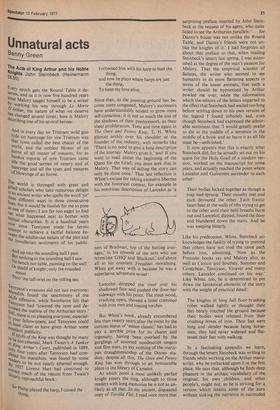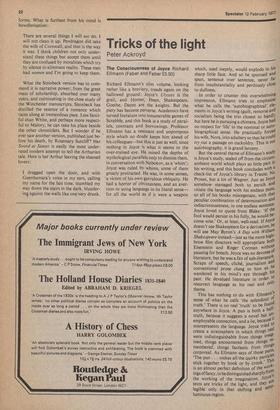Unnatural acts
Benny Green
The Acts of King Arthur and his Noble
Knights John Steinbeck. (Heinemann 26.50) Every epoch gets the Round Table it deserves, and as it is now five hundred years tince Malory taught himself to be a writer uY, working his way through Le Movie
Arthur, the nature of what we deserve has changed several times; here is Malory describing one of his several heroes: And in every day sir Tristram wold goo ryde on huntynge for sire Tristram was that tyme called the best chacer of the world, and the noblest blower of an home of all maner of mesures, for as bookes reporte of syre Tristram came ale the good termes of venery and of huntynge and all the syses and mesures of blowynge of an home.
1,11e world is thronged with great and Ifted scholars who take rapturous delight 1,4 an ancient writer who spells the word 'sir' ithree different ways in three consecutive Ines, but it would be foolish for me to pose aS one of them; I am far too eager to find ?tit what happened next to bother with Le >qua] obscurities. It is a hundred years nay', since Tennyson made his heroic. rtern Pt to achieve a tactful balance betkween the adulterous nature of the plot and bowdlerian sentiments of his public.
And up into the sounding hall I past But nothing in the sounding hall [saw No bench nor table, painting on the wall Or shield of knight ; only the rounded
MOOn
I hro' the tall oriel on the rolling sea.
1..enoYson's evasions did not suit everyone; eredith found the sanctimony of the -rdYlls offensive, while Swinburne felt that enoYson had 'lowered the note and de-, sel:foed the outline of the Arthurian story. I till, there is no pleasing everyone, especialY YOur fellow-poets, and Tennyson could at least claim to have given Arthur some "cellent publicity. tni,f IdYlls of the King was thought by many oe too ethereal, Mark Twain's A Yankee clorrif(ing Arthur's Court, published in 1889, 1Y four years after Tennyson had comglet,.4 L.
tus marathon, was found by some Leaders to be not nearly ethereal enough.
e Y 1927 Lorenz Hart had contrived. to bIx.traer much of the venom from Twain's tterlY reproachful book : Sir Philip played the harp, I cussed the thing,
crowned him with his harp to bust the thing, and now he plays where harps are just the thing, To keep my love alive.
Since then, as the jousting ground has become more congested, NIalory's successors have understandably tended to grow more self-conscious; it is not so much the size of the shadows of their predecessors, as their sheer proliferation. Time and time again in The Once and Future King, T. H. White glances archly over his shoulder at the founder of the industry, with remarks like 'There is no need to give a long description of the tourney. Malory gives it,' and 'If you want to read about the beginning of the Quest for the Grail, you must seek that in Malory. That way of telling the story can only be done once.' That last reflection is White's excuse for taking excessive liberties with the historical context, for example in his notorious description of Lancelot as 'a
sort of Bradman, top of the batting averages,' in his episode of the ants who use terms like 'GHQ' and 'Blackout,' and above all in his constant Freudian moralising. White got away with it because he was a superlative adventure writer:
Lancelot dropped the visor over his shadowed face and pushed the door-bar sideways with his point. The stout wood, crashing open, showed a lintel crammed with iron men and tossing torches.
But White's book, already encumbered less than twenty years after the event by the curious status of 'minor classic,' has had to pay a terrible price for its charm and ingenuity, having been overlaid by the gurglings of assorted nondescript singers and film stars, to say nothing of the marzipan draughtsmanship of the Disney studios; despite all this, The Once and Future King has won through to an honourable place in the library of Camelot.
At which point a most unlikely parfait knight enters the ring, although to those readers with long memories he is not as unlikely as all that. In my ancient, dog-eared copy of Tortilla Flat, I read once more that surprising preface inserted by John Steinbeck at the request of his agent, who quite
failed to see the Arthurian parallels: for Danny's house was not unlike the Round Table, and Danny's friends were not unlike the knights of it.' I had forgotten all about that preface so that, when reading Steinbeck's letters last spring, I was astonished at the degree of the man's passion for Malory. That the empirical scientist of Salinas, the writer who seemed to see humanity in its more flattering aspects in terms of the lower animals, that such a writer should be hypnotised by Arthur bowled me over, while the information which the editors of the letters imparted 10 the effect that Steinbeck had waited too long before settling down. to his own version of the legend I found infinitely sad, even though Steinbeck had expressed the admirable sentiment that 'I would greatly prefer to die in the middle of a sentence in the middle of a book and so leave it as all life must be---unfinished.'
It now appears that this is exactly what Steinbeck did, for he actually set out on his quest for the Holy Grail of a modern version, worked on the manuscript for some years, and actually reached the point where Lancelot and Guinevere surrender to each other:
Their bodies locked together as though a trap had sprung. Their mouths met and each devoured the other. Each frantic heart beat at the walls of ribs trying to get to the other until their held breaths burst out and Lancelot, dizzied, found the door and blundered down the stairs. And he was weeping bitterly.
Like his predecessor, White, Steinbeck acknowledges the futility of trying to pretend that others have not trod the same path before him, admitting, 'Now as the Frensshe books say and Malory also, as well as Caxton and Southey, Sommer and Cone.ybear, Tennyson, Vinaver and many others, Lancelot continued on his way.' Like White, too, he is determined to pin down the fantastical elements of the story with the weight of practical detail:
The knights in long full floor-brushing robes walked lightly or thought their feet barely touched the ground because their bodies were released from their crushing boxes of iron. Their feet were long and slender because being horsemen, they had never widened and flattened their feet with walking.
In a fascinating appendix we learn, through the letters Steinbeck was writing to friends while working on the Arthur manuscript, why he embarked upon it in the first place. He says that, although he finds deep pleasure in the archaic vocabulary of the original, his own children, and other people's, might not, so he is striving for a version which retains some of the aura without sinking the narrative in outmoded
forms. What is furthest from his mind is bowdlerisation: There are several things I will not do. I will not clean it up. Pendragon did take the wife of Cornwall, and that is the way it was. I think children not only understand these things but accept them until they are confused by moralities which try by silence to eliminate reality. These men had women and I'm going to keep them.
What the Steinbeck version has to commend it is narrative power; from the great mass of scholarship, absorbed over many years, and culminating in the close study of the Winchester manuscripts, Steinbeck has distilled the essence of a romance which races along at tremendous pace. Less fanciful than White, and perhaps more respectful to Malory, he can take his place beside the other chroniclers. But I wonder if he ever saw another version, published just before his death, by Rosemary Sutcliff? Her Sword at Sunset is easily the most underrated modern attempt to tell the Arthurian tale. Here is her Arthur leaving the shamed lovers: I dragged open the door, and with Guenhumara's voice in my ears, calling my name for the last time, stumbled my way down the stairs in the dark, blunder in the walls like one very drunk.



































 Previous page
Previous page